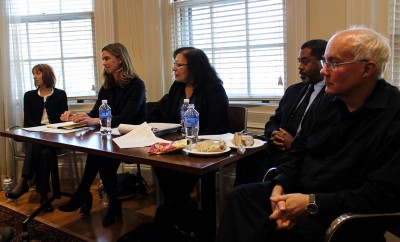
In an effort to bridge the gap between Boston’s neighborhoods and promote citywide inclusivity, the Boston University Initiative on Cities hosted a seminar Thursday called The Inclusive City.
Four panelists, each with their own expertise in the fields of economics, social work, education and architectural design, spoke about how income inequality, social injustice, educational disparity and a lack of adequate housing serve as detriments to a sense of inclusion in cities.
“Inclusivity does not mean tolerance … There’s responsibility that takes a lot of moral courage with institutional value that makes you squirm. We want to go beyond discomfort to make all [feel] more included,” said Carmen Torres, a clinical instructor in the School of Education.
Approximately 40 faculty, students and residents attended the seminar at the IoC office at 75 Bay State Road.
Phillipe Copeland, a clinical assistant professor in the School of Social Work who served as a panelist, said paying attention to the way people perceive and treat each other is a step forward in creating cities that treat all of its citizens equally.
“An inclusive city is a racially just city,” he said. “It’s a city where there are procedures by which the distribution of benefits and burdens of citizens is made according to quality, merit or need and not white supremacy … that’s how you know an inclusive city when you see it.”
Copeland said an inclusive urban society couldn’t exist with the current mentality that justifies dehumanization and police violence.
“I have a 6-year-old son, and he sees police the way he should see them, as heroes,” he said. “Who is responsible to make sure his trust isn’t violated? I have to teach him how to tolerate with law enforcement.”
Another panelist at the seminar, Robert Margo, an economics professor in the College of Arts and Sciences, said cities are incubators of economic growth and innovation, but the social mobility that comes with it is not always available to all.
“Diverse doesn’t necessarily mean inclusive. You need upward mobility,” he said. “The country as a whole still has a long way to go to improve income inequality between white and black people.”
Katie Swenson, vice president of national design at Enterprise Community Partners and another panelist, said the current state of public housing and separated neighborhoods hinders how inclusive cities can be.
“If you don’t have a basic place to live, it’s hard to do anything,” she said. “Public housing communities and low-income neighborhoods are often isolated. It’s not just a spatial issue.”
Several attendees said they are passionate about the issues presented at the seminar and enjoyed hearing about potential solutions from experts in various fields.
Chelsea Beytas, a senior in the Sargent College of Health and Rehabilitation Sciences, said having inclusiveness is in the best interest of everyone.
“Inclusivity affects people and their quality of life,” she said. “If we don’t talk, then we will continue the false misrepresentation that inclusivity exists and then we’re back talking about how we’re not living in a post-racial society.”
Beytas said she had hoped more people would attend the panel.
“I’m saddened by the show up for events like these versus [that] of sport games. I know it’s important and that’s why I’m here,” she said. “This is just as important. There should be a desire to learn outside of the classroom.”
Shannon Johnson, 23, a BU alum and resident of Jamaica Plain, said she learned better ways to foster the feelings of inclusiveness.
“What I took away is that there are ways to act now instead of just being uncomfortable,” she said. “People need to gather together and show compassion, humanity and solidarity. We’re all humans and created to be equal, so inclusiveness shouldn’t even be an issue.”





















































































































